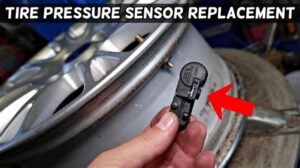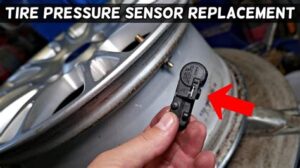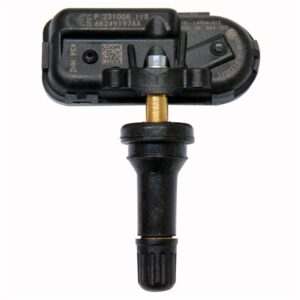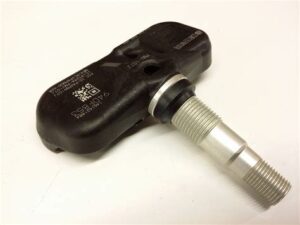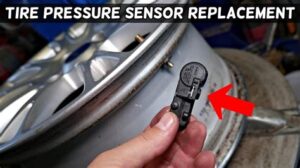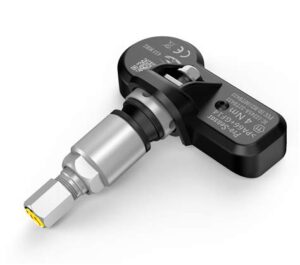Discover the importance of maintaining proper tire pressure, how VW tire pressure sensors work, common issues, and the benefits of using them for safety.In the realm of automotive safety, proper tire maintenance often takes a backseat, but it plays a crucial role in vehicle performance. One of the key components in ensuring that your Volkswagen runs smoothly is the tire pressure sensor, a sophisticated device that monitors tire inflation levels. Understanding the ins and outs of the VW tire pressure sensor is essential for every vehicle owner, especially as it relates to the importance of maintaining proper tire pressure. This not only enhances your driving experience but also contributes to safety and fuel efficiency. In this blog post, we’ll explore how these sensors work, identify common issues that may arise, and discuss the numerous benefits that come from utilizing them effectively. Join us as we delve into the intricacies of VW tire pressure sensors and unlock the secrets to smarter driving.
Understanding VW Tire Pressure Sensor
The VW Tire Pressure Sensor is a crucial component of the vehicle’s safety and performance systems. It is designed to monitor the air pressure in each tire and provide real-time data to the driver through the dashboard display. Proper tire pressure is essential for optimal handling, fuel efficiency, and safety.
In modern Volkswagen vehicles, the tire pressure monitoring system (TPMS) uses sensors placed inside the tires to measure the air pressure. These sensors can either be direct or indirect:
- Direct TPMS: Uses pressure sensors inside each tire to measure the air pressure directly and transmit this information to the vehicle’s computer.
- Indirect TPMS: Measures tire pressure indirectly through the vehicle’s ABS system by monitoring wheel speed to detect changes in tire circumference.
Understanding how the VW tire pressure sensor works is vital for maintaining the health of your vehicle. When the air pressure in any tire falls below a predetermined level, the system triggers a warning light on the dashboard. This alert serves as a reminder to check and inflate the tires when necessary.
Key Functions of the VW Tire Pressure Sensor
| Function | Description |
|---|---|
| Monitoring Pressure | Continuously checks tire pressure in real-time. |
| Alerting the Driver | Signals low tire pressure conditions through a dashboard indicator. |
| Enhancing Safety | Improves vehicle stability and handling by ensuring proper tire pressure. |
Overall, understanding the VW Tire Pressure Sensor and its significance not only promotes safe driving but also helps extend the lifespan of your tires and improve overall vehicle efficiency. Regular checks and attention to this system can prevent costly repairs and ensure a smoother ride.
Importance of Maintaining Proper Tire Pressure
Maintaining proper tire pressure is crucial for the overall performance and safety of your Volkswagen vehicle. Low or high tire pressure can lead to a variety of issues that could compromise your driving experience. Here are several reasons why you should prioritize checking and maintaining the correct tire pressure:
- Enhanced Safety: Properly inflated tires ensure optimal traction and handling, reducing the risk of accidents caused by tire blowouts or loss of control.
- Improved Fuel Efficiency: Tires that are incorrectly inflated can cause your vehicle to consume more fuel, leading to higher costs and greater environmental impact. Keeping tires at the recommended pressure ensures better gas mileage.
- Prolonged Tire Life: Maintaining the correct tire pressure can prevent uneven wear and tear, extending the lifespan of your tires and saving you money on replacements.
- Maximized Performance: Correct tire pressure allows your VW to perform at its best, whether you’re commuting or taking a longer journey.
- Reduced Emissions: Keeping tire pressure in check contributes to lower emissions, as it enhances fuel efficiency and reduces the amount of fuel burned.
According to the National Highway Traffic Safety Administration (NHTSA), about 1 in 4 vehicles have at least one tire that is significantly under-inflated. This not only increases the risk of accidents but also leads to premature tire wear.
For your Volkswagen, it is important to check the tire pressure regularly and before long trips, particularly during extreme temperature changes. Always refer to your vehicle’s owner manual or the sticker located on the driver’s door jamb for the correct tire pressure specifications.
A safe drive begins with proper tire pressure. – Automotive Safety Expert
In summary, maintaining proper tire pressure is not just a matter of ensuring your VW operates efficiently; it is a critical aspect of car maintenance that enhances safety, improves gas mileage, and prolongs the life of your tires.
How VW Tire Pressure Sensors Work
The VW tire pressure sensor is an essential component of your vehicle’s safety and performance system. It plays a crucial role in monitoring the tire pressure of your VW vehicle, ensuring that your tires are properly inflated for optimal performance. Understanding how these sensors work can help you maintain your vehicle more effectively.
Types of Tire Pressure Sensors
VW uses two main types of tire pressure monitoring systems (TPMS): Direct TPMS and Indirect TPMS.
- Direct TPMS: This type uses sensors mounted directly on the valve stems of each tire. These sensors measure the actual tire pressure and send this information to the vehicle’s onboard computer.
- Indirect TPMS: This system doesn’t use dedicated sensors. Instead, it uses the ABS (Anti-lock Braking System) wheel speed sensors to monitor differences in rotational speeds of the tires, inferring potential pressure issues based on these variations.
How Direct Tire Pressure Sensors Work
In a direct TPMS, each sensor continuously measures the tire pressure. When the pressure deviates from the standard range, the sensor activates and transmits a warning signal to the driver’s dashboard. Here’s a brief overview of the process:
- The sensor detects the tire pressure and temperature.
- This data is transmitted wirelessly to the car’s engine control unit (ECU).
- If the system identifies an abnormality or significant variance from the recommended pressure, it triggers a warning light on the dashboard.
How Indirect Tire Pressure Sensors Work
The indirect TPMS operates differently:
Instead of measuring pressure directly, it analyzes the speed of each tire. When a tire is under-inflated, it has a smaller diameter, causing it to rotate faster than a properly inflated tire. The ECU uses this information to determine if there’s an issue:
- The vehicle measures the rotation speed of each tire.
- It compares these speeds against standard values.
- Any significant discrepancy will trigger a warning signal on the dashboard.
Conclusion
Understanding how VW tire pressure sensors work, whether direct or indirect, is vital for maintaining your vehicle’s efficiency and safety. By ensuring your tires are adequately inflated, you can improve fuel efficiency, enhance tire life, and ensure better handling and safety on the road.
Common Issues with VW Tire Pressure Sensors
The VW tire pressure sensors are integral components designed to monitor and report the air pressure in your vehicle’s tires. While these sensors are highly reliable, they can occasionally encounter issues that may affect their performance. Here are some common problems associated with VW tire pressure sensors:
| Issue | Description | Potential Solution |
|---|---|---|
| Low Battery | The sensor’s battery can deplete over time, causing it to stop functioning. | Replace the sensor or its battery if applicable. |
| Faulty Installation | If the sensor was improperly installed, it might not read tire pressure accurately. | Reinstall the sensor following proper guidelines. |
| Sensor Damage | Physical damage from road hazards can lead to sensor failure. | Inspect tires and replace damaged sensors immediately. |
| Interference | Other electronic devices in the vehicle may interfere with the sensor’s signal. | Relocate or turn off interfering devices. |
| Temperature Fluctuations | Extreme changes in temperature can cause inaccurate readings. | Allow tires to equilibrate to a stable temperature before checking pressure. |
By being aware of these potential issues with your VW tire pressure sensors, you can take proactive measures to ensure they function correctly. Regularly checking your tire pressure and addressing any of these common problems can help maintain the performance and safety of your vehicle.
Benefits of Using VW Tire Pressure Sensor
The VW tire pressure sensor is an essential component in maintaining vehicle safety and performance. Here are some of the key benefits of using these sensors:
- Enhanced Safety: Proper tire pressure is critical for safe driving. VW tire pressure sensors monitor the air pressure in your tires, alerting you to any irregularities that could lead to unsafe driving conditions.
- Improved Fuel Efficiency: Maintaining the correct tire pressure can significantly improve your vehicle’s fuel efficiency. Underinflated tires increase rolling resistance, causing your engine to work harder and consume more fuel.
- Prolonged Tire Life: By keeping an eye on tire pressure, VW tire pressure sensors help ensure that your tires wear evenly, reducing the risk of premature wear and tear.
- Real-Time Monitoring: These sensors provide real-time data about tire pressure, enabling you to make timely adjustments before small issues turn into significant problems.
- Reduced Risk of Blowouts: Regularly monitored tire pressure minimizes the risk of tire blowouts, a common cause of accidents on the road.
- Convenience: With a VW tire pressure sensor, you can easily check your tire pressure without the need for traditional gauges, making it a more user-friendly option for vehicle maintenance.
In summary, utilizing VW tire pressure sensors offers numerous advantages that contribute to both vehicle safety and efficiency. By ensuring that your tires are properly inflated, you can enjoy a smoother ride, enhanced fuel economy, and a longer-lasting vehicle.
Frequently Asked Questions
What is a VW tire pressure sensor?
A VW tire pressure sensor is a device that monitors the air pressure within the tires of Volkswagen vehicles and helps alert the driver if tire pressure is too low or too high.
Why is it important to maintain proper tire pressure?
Maintaining proper tire pressure is crucial for vehicle safety, fuel efficiency, and tire longevity. Under-inflated or over-inflated tires can lead to poor handling and increased wear.
How do I know if my VW tire pressure sensor is malfunctioning?
Signs of a malfunctioning tire pressure sensor may include a warning light on the dashboard, inaccurate pressure readings, or failure to alert when tire pressure is low.
Can I reset the tire pressure sensor in my VW?
Yes, you can reset the tire pressure sensor in your VW, usually through the vehicle’s onboard computer system or by driving at a certain speed for a specified time after adjusting the tire pressure.
What should I do if the tire pressure light stays on?
If the tire pressure light remains on after checking the tire pressures, you should inspect for leaks, check for a potential sensor issue, or consult a professional mechanic.
How often should I check my tire pressure?
It’s recommended to check your tire pressure at least once a month and before long trips, as tire pressure can fluctuate due to temperature changes and driving conditions.
Where can I find the recommended tire pressure for my VW?
The recommended tire pressure for your VW can usually be found in the owner’s manual, on a sticker located inside the driver’s side door jamb, or on the fuel filler cap.
